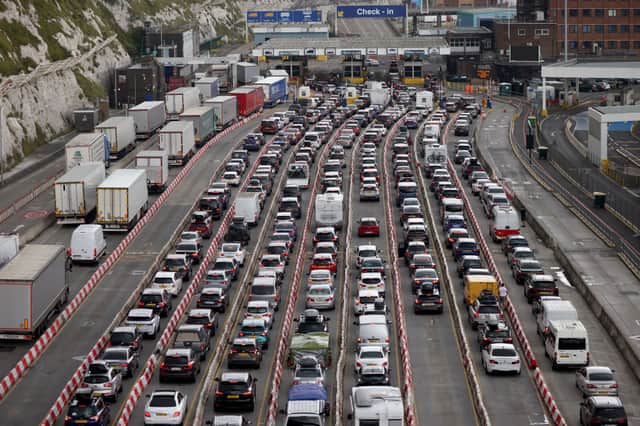Brexit: queues and 'travel chaos is only going to get worse' when new EU fingerprint and facial checks come in
and live on Freeview channel 276
The queues and travel "carnage" seen at British ports recently will only get worse with the EU's new biometric requirements, experts have told NationalWorld.
Since Brexit, new passport requirements have seen chaos at ferry terminals, the Eurotunnel and Eurostar - in some cases people waiting 21 hours to board. Just today (21 December), families' holiday plans were upended at the last minute due to a rail strike in France. Eurostar services and all Eurotunnel Le Shuttle routes were cancelled.
Advertisement
Hide AdAdvertisement
Hide AdAnd Candice Mason, of Masons Minibus & Coach Hire Ltd, who described the scenes at Dover over the last year "as carnage", has warned that in 2024 queues are only likely to get worse. Next autumn, the EU is bringing in its Entry-Exit System, which will see every visitor from a "third country", like the UK, have to give fingerprints and facial scans. Every time someone enters the EU these will need to be checked.
"They already don't have the infrastructure just to check passports, so I don't know how they are going to do thumb and facial checks," Candice said. "They don't have the manpower, they don't have the space for it all to happen. It's definitely going to cause delays.
"Based on the fact, earlier this year during the ski season, we had coachloads of schoolchildren sitting at Dover waiting 21 hours with no facilities and nowhere to get a drink." Candice explained that schools have told they're going to stop using coaches because of the chaos, and other companies are stopping arranging European travel.


"All of us have had problems around the year, particularly around those peak seasons, it's gotten worse," she said. Already coaches are missing ferries due to increased passport checks and drivers are using up their legal driving hours waiting in queues. And that's before the additional regulations come in.
Advertisement
Hide AdAdvertisement
Hide AdPhil Smith, from the Confederation of Passenger Transport UK, said: "The problem is that the Port of Dover, the Eurotunnel and Eurostar have got a fairly restricted amount of space to install the infrastructure, and this will determine how quickly people get through. The first year we have to manage it, it's going to take considerably longer than at the moment. We don't know how the Port of Dover are going to be able to handle it."
Candice added the issues were pushing people to fly, which causes far more emissions than coach travel. "We should be at the forefront of the government's agenda for transporting people, but we're just not," she said. "It's all changed because of Brexit."
Getlink, which operates the Eurotunnel, is spending £67 million on a new centre, where drivers will have to get out of their cars to enter or verify biometric data. This would be able to process 500 cars per hour, 60% of the tunnel's hourly capacity.
Earlier in the year, French public finance watchdog Cour des Comptes released a report stating that queues at the UK's border with France will double when the EES is brought in. And Doug Bannister, Port of Dover CEO, said it will cause "significant and continued disruption for a very long time".
Advertisement
Hide AdAdvertisement
Hide AdEurostar terminals are one of the places where queues will likely be at their most severe. A spokesperson said: "We are working closely with UK and EU member states authorities, as well as with our station owners, to prepare for the implementation of EES. We are actively engaging governments to try and find solutions to preserve a smooth travel experience for our customers."
Around six months after the Entry-Exit System is brought in, the EU is expected to roll out the Electronic Travel Information and Authorisation System (Etias). This will be required for non-EU citizens who do not need a visa - such as the UK and other countries like New Zealand - to enter the Schengen Area. This includes almost all EU countries such as France, Spain and Germany, however not Ireland, Cyprus or Romania.
It will require a £6 (7 Euro) fee and last for three years. It was originally due to be implemented from November 2023, but has been delayed repeatedly. The EU Council has now said: “Etias will be ready to enter into operation in spring 2025.”
Ralph Blackburn is NationalWorld’s politics editor based in Westminster, where he gets special access to Parliament, MPs and government briefings. If you liked this article you can follow Ralph on X (Twitter) here and sign up to his free weekly newsletter Politics Uncovered, which brings you the latest analysis and gossip from Westminster every Sunday morning.
Comment Guidelines
National World encourages reader discussion on our stories. User feedback, insights and back-and-forth exchanges add a rich layer of context to reporting. Please review our Community Guidelines before commenting.
